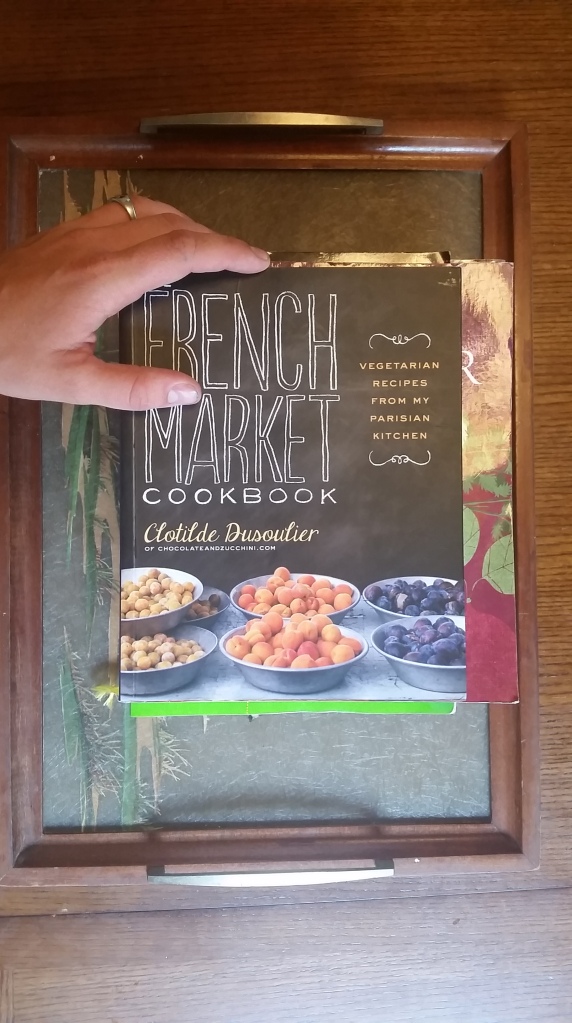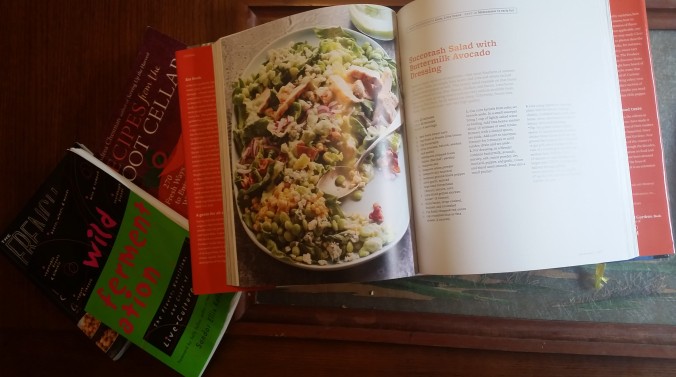This post may contain Amazon affiliate links.
That’s how I earn my blogging income, so thanks for clicking through!
Dear gentle readers and those not so gentle as well,
We like to eat well, and we also like to save money. We like to eat local food, and we love fresh and seasonal food. Logically, then, much of what we eat every day comes from the farm. We also don’t like eating the same recipe twenty-hundred times in a season, so I am constantly scouting new cookbooks. I’ve whittled down a list of books that work very well for farmer’s market shoppers, CSA members, seasonal eaters, farmers and gardeners. I’ve stuck with this short list because every time I go to these books, I can find everything I need for a given recipe in one trip out to the farm, and the odds and ends (olive oil, balsamic vinegar), I tend to have in my pantry. These books stay in my kitchen for frequent, daily use while other interesting, but possibly less useful books, go elsewhere to be referenced occasionally.
This list is not comprehensive, and in fact I am hoping you’ll send me your favorite titles as well; I am always looking to bolster my creative closet of books! The following books are in no particular order (other than smallest to biggest!).
My Favorite Cookbooks for Cooking from the Farm

1. The French Market Cookbook: Vegetarian Recipes from My Parisian Kitchen
Clotilde Dusoulier is the totally adorable and well-loved blogger at chocolateandzucchini, and she is not a vegetarian. She is not gluten or dairy free, either, but as it happens, most of the recipes in this vegetarian book are also gluten and dairy free. I’m not vegetarian either, but I don’t eat loads and loads of meat because it’s expensive and it just isn’t sustainable (which you learn when you are growing your own food), to eat turkey and steak every week (more often than not we’re eating bones, feet and organs!). Truth to be told, I was prepared to not like this book because so many “market” books don’t live up to their name, but truly every ingredient in her recipe will be found growing together, or harvested the same weekend. In fact, the book is divided into seasons, not categories, to make it even easier to plan your next trip to the farmer’s market. And the book is really cute, and precious, and pretty, and has lots of juicy pictures. I gave it a five star review when I reviewed it for the San Francisco Book Review.
2. Recipes from the Root Cellar: 270 Fresh Ways to Enjoy Winter Vegetables
And oh, how I love this book. It was recommended to me by copy editor and reviewer and vegetarian foodie Holly Scudero, who had an early galley copy that I loved to drool over. Mr H bought it for me when Borders Books went out of business – we pretty much cleared out the cookbook shelves, and this gem was one of the best things that happened that day. Andrea Chesman grows her own food, so her recipes have such a natural way of being seasonal that it feels a little ridiculous to even point it out. The first time I made sauerkraut was from this book; the long, lonely winter in California was filled with comforting, steaming bowls of Italian meatball soup, and pans of maple-roasted vegetables that I wrapped myself around like a mother cat with her kittens. This is one of the best books in my kitchen.
3. Wild Fermentation: The Flavor, Nutrition, and Craft of Live-Culture Foods
And speaking of sauerkraut, behold the fermentation king! For those of us who truly eat seasonally from our gardens, fermentation is one of the many food preservation techniques we rely on to get nutrient-dense, home-grown produce all year long. This book will take you from novice to advanced fermentation artist (especially if you follow it with The Art of Fermentation, a veritable treatise on the subject!). Since he grows much of his own food, and since fermentation is an art developed solely for the purpose of preserving food in it’s season, it’s very easy to find everything you need for a given recipe growing at one time. Can’t find Chinese cabbage? Maybe it doesn’t grow in your area (so you’ll have to ferment pineapple and coconuts instead!), or maybe it’s the wrong season for it (and you should try turnips and carrots while you wait!). I fell in love with this book when I borrowed it from a friend, and then I had to buy my own copy and now it’s splattered and marked in and the pages are wobbly at the bottom from when a gallon of kimchi leaked out onto it.
4. The Real Food Cookbook: Traditional Dishes for Modern Cooks
Nina Planck, who writes at ninaplanck.com, grew up with farmer parents, eating farmer food. She is accustomed to and familiar with the rhythms of the garden and the bounty and not-so-bounty of some foods. Her book has a certain respect towards the way a farm grows – look, we can’t put ground beef in every recipe or we’ll run out of cows and have a freezer full of feet – and she strongly encourages readers to vary the recipes, saying she will never make it the same way twice herself and we should adapt to our areas. I love that philosophy since I never follow recipes but, as she suggests, use them as inspiration (even though I often start out with good intentions of following the recipe very strictly, it never happens!). Her book makes me so happy, and so hungry, and so eager to run out and harvest a basketful of dinner!
I guess I was a little surprised how much I liked this book, since it seemed so commercial when I first picked it up. But it actually delivers some delicious surprise! The meat section focuses on very American cuts of meat like flank steak and meat-centric dishes, but that is only a very small portion of the overall book (and that is not to say we don’t need the occasional recipe for a flank steak! It’s just pretty darn rare… bad pun?). The fritters, salads, pizzas and desserts – oh, the desserts – overcompensate the cook with plenty to work with. In fact, as I am flipping through it I am wondering if the roasted vegetables and chickpeas might make an appropriate dinner … or shoestring sweet potatoes and beets?
6. Local Flavors: Cooking and Eating from America’s Farmers’ Markets
Let me just start by saying anything from Deborah Madison has my automatic seal of approval. She’s on this list twice, if that tells you anything! She has a dessert book, too, that would be on this list I am sure if I were so lucky as to own it and have some experience with the recipes (I browsed through it at at the library once, but I was visiting another city at the time so I couldn’t check it out!). Her book has an astonishing ability to have recipes that use literally every single item I dug up or trimmed off the plant that day. When I first joined a CSA, I felt like every box was custom-built for one of her recipes. I fell in love with her work and have been a groupie ever since. When you need vegetable-centric dishes from somebody who knows vegetables, and knows plants and really, really knows food – Madison delivers the goods.
7. Vegetable Literacy: Cooking and Gardening with Twelve Families from the Edible Plant Kingdom,
with over 300 Deliciously Simple Recipes
This is one of the newest books in my collection. I saw it at TJ Maxx and it was in my cart before you could shake a pasture-raised organically-fed lamb’s tail. Rich, nourishing, hearty, and most fascinating of all, divided by plant families. I could read this book all day long, but the shimmering pictures on the page would send me to the kitchen before long! Prepare to get an education on the plant kingdom, flavor profiles and recipe history when you crack open this tome of wonder. Like all her books, the recipes are full of seasonal items that grow at the same time, and, as far as I can tell, in the same place.
You’d be surprised how much international cookbooks stick to seasonal cooking – not because it’s a ‘thing’ or a ‘movement’ but because they don’t all shop and eat out of the supermarket! This Italian cookbook has an easy fluidity to the recipes – they just feel so natural, so easily fresh and seasonal. It’s a pleasure to cook out of it, and easy. When I have a bumper crop of cucumbers, I go to the cucumber section and pick a few unique recipes. It’s definitely better than eating cucumber salad three times a day!
9. Food in Jars: Preserving in Small Batches Year-Round
(Not pictured above) Of course, I have to add a canning book. Marisa McClellan, with her gorgeous and tasty blog, has been a favorite of mine for years now, and she never fails to deliver! She shops her local farmer’s markets or is gifted produce from friends, so her recipes also come seasonally quite naturally. With small batches for canning – you can do this while you make lunch, instead of setting aside the whole weekend for it – her recipes are attainable and enjoyable. I’ve loved every single recipe of hers I’ve ever made – they’ve all turned into family favorites, requested gifts, popular dishes at the house. When the gas repairman sampled the pickled beets, he said, “I’ve never eaten a beet in my life! I can’t stop eating these!” He took the whole jar home.
10. I need you to fill in this blank!
I need another market-worthy book! Are there any good raw books out there, or international cookbooks? I love Mediterranean and Indian and Persian food – I’ve been curious to try The New Persian Kitchen, and of course anything by Ottolenghi but especially his new Jerusalem: A Cookbook
. I love all-American, old fashioned or contemporary. What are your suggested titles? Thanks for reading along!!
Anxiously awaiting your reply,
Mrs H
Stay connected with Facebook, the great Lego of internet life




I, of course, LOVE that you started with a Parisian-themed cookbook (even though that was because it was the smallest)! I have followed Clotilde’s blog for years and love it as much for the French stories as for the recipes. But, as for the Queen of Cookbooks, bien sur, Julia Child’s Mastering the Art of French Cooking, and that not so much for the recipes (it once took me 3 days to make an apricot/chocolate dessert!) as for the “food science” and “how-tos” behind every recipe. And to fill in the blank for #10: anything by David Lebovitz (http://www.davidlebovitz.com/) He’s a ex-pat chef living in Paris and his blog is one of the best. His latest book, My Paris Kitchen, is a delight for it’s wry, slightly edgy look at the French world and Paris in particular, which he obviously loves (particularly the food!) and for his recipes, which he sources locally as much as possible while also reviewing restaurants, food trucks, what’s hot and what’s not, and his own life among the French. Bon appetit! (and thank you for this list!)
LikeLike
I adore EVERYTHING David Lebovitz does!!! You clearly have excellent taste in chefs 😉 His The Perfect Scoop book (originally recommended to me by my friend Carmen from domesticendeavors.net), was my first introduction to him, and I have followed him avidly ever since.
You will be appalled to hear I do NOT have Julia Child’s book – I must obtain a copy!! I did get to see her kitchen in the American History Smithsonian in Wa DC, and that rocked my little food world.
LikeLike